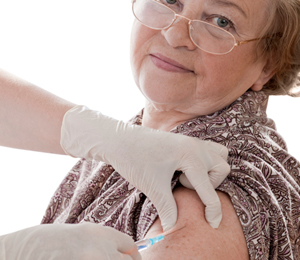 High dose or adjuvanted influenza vaccination rather than regular-dose influenza vaccination has been recommended for all patients with rheumatic and musculoskeletal diseases (RMD) over 65 years and for younger patients 18-65 years on immunosuppressive medications.
High dose or adjuvanted influenza vaccination rather than regular-dose influenza vaccination has been recommended for all patients with rheumatic and musculoskeletal diseases (RMD) over 65 years and for younger patients 18-65 years on immunosuppressive medications.
The conditional recommendation is one of several expanded indications for specific vaccines other than COVID-19 in recent ACR guidance [link to summary here] presented in detail at ACR Convergence.
Professor Clifton Bingham, director of the Johns Hopkins Arthritis Center, told the meeting that two RCTs had demonstrated that higher dose vaccines translate to higher seroconversion rates without an increased risk of AEs.
However he noted that the high dose or adjuvanted vaccines may not always be available.
“Any flu vaccine is recommended over no flu vaccine… and any flu vaccination today is better than delay,” he said.
The guideline also includes a strong recommendation to extend pneumococcal vaccination to patients with RMD aged <65 years who are on immunosuppressive medication.
For patients with RMD aged >18 years who are on immunosuppressive medication, the recombinant zoster vaccine was also strongly recommended.
“This is because patients with RMD are at higher risk of zoster than the older adults in whom vaccinations are routinely recommended,” he said.
The guideline also conditionally recommended vaccination against HPV for patients with RMD aged 26 – 45 years who are on immunosuppressive medication and not previously vaccinated.
“This is because patients on immunosuppressive therapy are at an increased risk of cervical dysplasia and cervical cancer.”
He noted two studies in lupus have demonstrated vaccination was immunogenic and well tolerated in patients <45 years.
The guideline also provided a conditional recommendation for giving multiple vaccinations on the same day rather than individual vaccinations on different days.
Modified medication schedules
Infectious diseases physician Professor Kevin Winthrop, from the Oregon Health & Science University, told the meeting there was new evidence regarding medication management around the time of vaccine administration.
In particular, antibody responses to vaccination were higher and more patients reached levels of seroprotection when methotrexate was held for two weeks.
“The question of how to hold or how long to hold is really a trade off of flare and disease activity,” he said.
The guideline recommends holding methotrexate for 2 weeks after flu vaccination and continuing the drug for other non-live attenuated vaccinations
He said clinicians should try to give vaccinations prior to rituximab or to delay vaccination for as long as possible after rituximab, except for influenza vaccine.
“This will allow the maximum humoral response to the vaccine,” he said. “The difference with influenza is really just about the season; there is a time to give it.”
Professor Winthrop also noted the strong recommendation to give all vaccines to patients on low dose prednisone <10 mg daily and a conditional recommendation to give all vaccines to patients on prednisone 10-20 mg daily.
However while flu vaccines can be given at high prednisone doses >20 mg daily, other non-live attenuated vaccination should be deferred.
The guideline also includes a comprehensive list of modified medication schedules at the time of live-attenuated virus vaccines.
A final recommendation is to not give rotavirus vaccine to infants within the first six months of life if they were exposed to rituximab in utero. This advice should be discussed with patients before they deliver their baby.